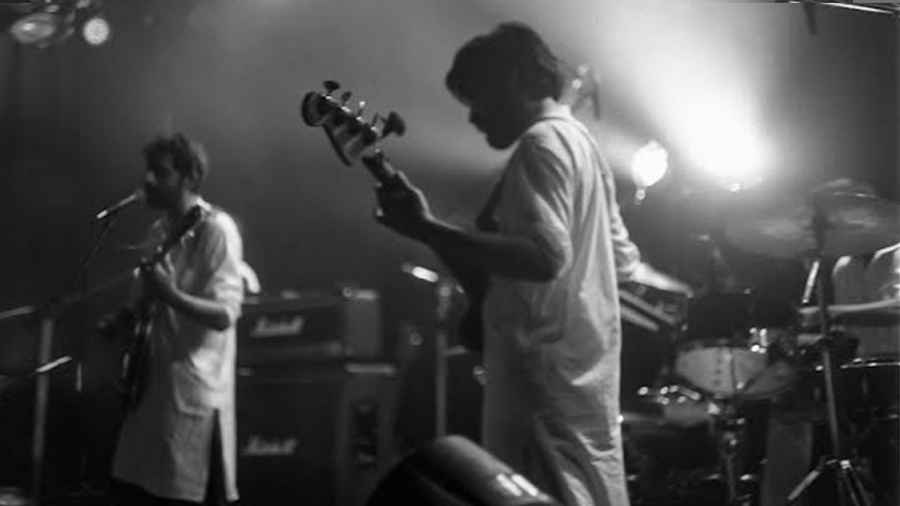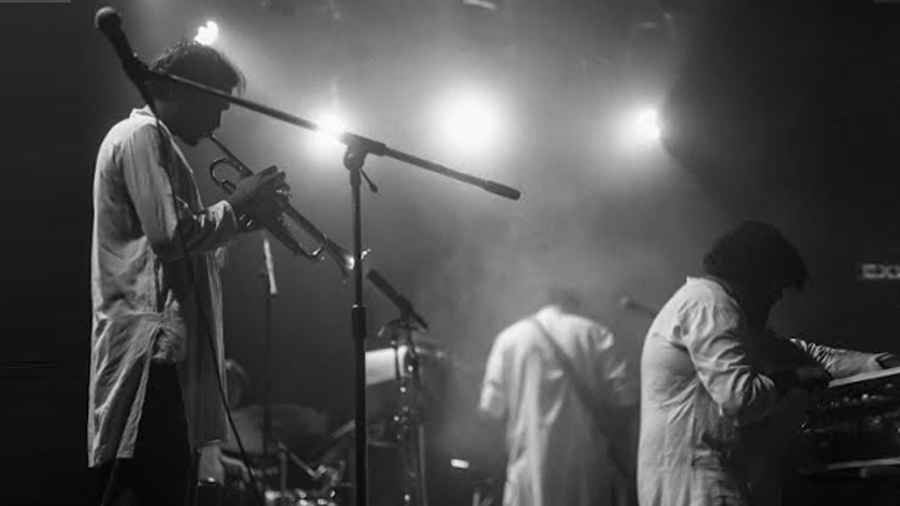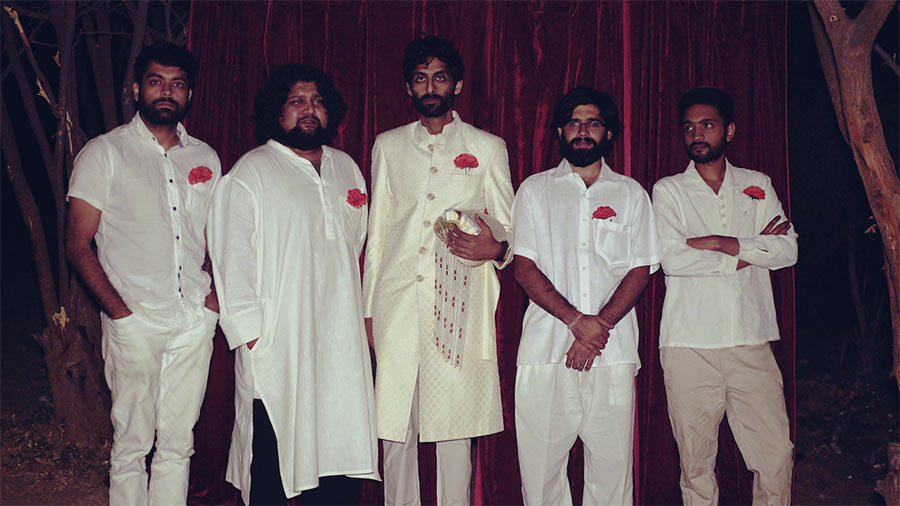It’s the voice that draws you in at first listen. Then the music. Underneath a pastiche of tones and textures, it is a dazzling outpouring of emotion. It’s like being blinded by this sudden jolt of light after having trooped out of a planetarium. You are still seeing stars even though you are no longer staring at shimmering interstellar delights inside a pitch dark dome. Outside, the sun is out, and it’s still beautiful. Then the tune takes a sharp turn. Stark, bold sonic patches burst forth. Guitar, bass, drums and a bit of reverb. Some electronics topped up with the drone of a harmonium. Pretty nice. Sit back and let Sinatra flow through your veins. Or, shall we dance?
Peter Cat Recording Co.’s Love Demons, among the early songs of this Delhi not Calcutta band was a wake-up call. Loud enough to reach la Paris where two blokes foraying into setting up a record label liked the song so much that they took a plunge and financed PCRC’s next new album. Bismillah! And ever since, Suryakant Sawhney, the helmsman of the band that owes its name to food, literature and serendipity, hasn’t had to look back. The events leading to their nomenclature start off as routine and up in Sawhney’s head. Good enough for a song.
It all happened on a sunny afternoon when Sawhney was in his early 20s. He is walking the streets of Calcutta while on a visit, courtesy of an invite from an uncle. Roaming around in search of — never mind — he soon finds himself in a compound with white sheets everywhere. “This, I soon realised, was a meat market that was being set up in the middle of the day. At that point, I was a vegetarian, and it turned out to be quite a dramatic experience in a funny way. I left the place and somehow I landed up in front of that restaurant,” he says relishing his own retelling of a story he has no doubt recounted before.
That restaurant was Peter Cat. It still is, on Park Street. Everyone in yesterday’s Calcutta and today’s Kolkata has at least one memory of the famous eating house now hallowed in culinary history for its Chelo Kebab and sundry other delights. But for Sawhney the experience was, let’s say, different. “I didn’t really care so much about the food or anything, but I really liked the design of the menu. I think Peter Cat had the face of a cat on the menu. First, I thought it was really direct — and super ugly at the same time. And then I thought, ‘what is this restaurant named after a Peter cat?’ And for some reason in my life that name just meant something.”
Good for him even though he admits that personally, he never really liked the name when starting off with his musical ventures. Later, Suryakant found Haruki Murakami, the Japanese writer whose books he insists he hasn’t read, apart from maybe one or two. Yet the fact that Murakami, who is also deeply into music and a long-distance runner, opened a café and jazz bar in Tokyo named “Peter-cat” got to him [Haruki Murakami and the Music of Words by J Rubin, his translator]. “I was like, ‘wow that is so absurd’. That means, this great writer has also seen the inherent beauty of the name for whatever bloody reason even though it’s such a dull name. So, I just stuck with it.”
Today, Peter Cat Recording Co. is seven albums old (Sinema, Wall of Want, Climax, Transmissions, Portrait of a Time, Bismillah, Happy Holidays) and many, many songs young. In little over a decade, their fan base has grown primarily in the United States, which means that a bulk of their royalties, streaming and licensing (for movies) revenues come from there. In India, sizeable groups of discerning listeners have adopted them in cities like Jaipur, Delhi (Gurgaon), Mumbai, Pune and Kolkata where they have performed, or are scheduled to, in an ongoing tour. Delhi has a solid following too and it has nothing to do with the fact that Messrs Karan Singh, Kartik Sundareshan, Dhruv Bhola, Rohit Gupta and Sawhney are all Dilliwallas now. It’s their music and Sawhney and Co.’s irreverence to staid, run-of-the-mill conventions that work. He doesn’t like to take himself seriously. Together, they’re only serious about their music.
Jerome and Alex were the two Parisians who decided to invest in PCRC’s new ventures after listening to Portrait of a Time, the album that includes Love Demons, a collage of two songs doffing a hat to the disco-inspired Hindi film music of the ‘80s. The duo’s fledgling label, Panache, brought out Bismillah circa 2019. “It worked out,” says Sawhney about how windows kept opening for them. “It’s about people. We just lucked out. They were just cool human beings, inherently good people.”

Suryakant Sawney: ‘Sinatra? Yeah, I get a lot of that’ Instagram
There’s more to PCRC’s music than good wishes and their seeming nonchalance. It helps that their music doesn’t fit in a box. Is Clown on the 22nd Dance Floor a rock song masquerading as gypsy jazz overindulgence? Is We’re Getting Married a synth ballad? What exactly is happening when the trumpet accentuates Floated By? Nothing that you can pin down in categories. Yet, PCRC’s calling card is about energy, originality, excitement and unpredictability. “The way I want to see it understood is like a trans-cultural sort of music,” elaborates Sawhney who believes the songs they create take from everything around the world. “It’s not genre-based music.” So Clown really is a fun song, a carnival-esque swing into “going insane” even while admiring how “she moves”. Floated By has a big-band feel to it in the genteel manner it chronicles “time” and “something good”, a sense that finds an echo in We’re Getting Married, which is about two lovebirds, who, having found each other “amongst a billion hearts”, are embarking on life’s journey as a piano-guitar jugalbandi keeps time.
There’s a lot to be said about music being able to create a fifth dimension, a sacred and personal place between time and space. With their songs, Peter Cat Recording Co. is able to own that place. When Sawhney sings and his band plays along, their covenant is with the listener. Nothing can ever come in-between. That’s why he thinks of themselves as “21st century romantics”.
So move over darling
If my heart bends
I'll know
And if I had to stay
You know I would
Have stayed
So baby don't hold me back
Cause if I win
I'll change _ Memory Box
“As a band, we’ve been completely isolated from the music business and never really ended up working with people who are from the music industry which, in a funny way, worked out the best for us.” Sawhney is damn right. For, artistes that make up a PCRC, or other musical enterprises that now come under the broad umbrella of “independent”, are also producers of their own work. “I think that’s the big difference between our generation of musicians and the ones before. We also end up being the ones who record and mix and engineer. So you very much have a say in what your band is going to sound like.”
Has PCRC ever been told that their lead singer sounds like Frank Sinatra? “Yeah, I get a lot of that,” Sawhney says sheepishly, almost embarrassed at the mention of the idol of generations. “I’ll take that as a compliment,” he adds. “When I was growing up I didn’t hear a lot of that music. But as I grew older, I got drawn more to Kishore Kumar, Rafi, Mukesh and Hemant Kumar. And their voice is also beautiful,” he says, letting on his own childhood influences. If his father, whom he lost when he was very young, listened to classic rock (Doors, The Beatles et al), his mother was into traditional Indian music. “There was this staunch difference in my household, basically with my mom listening to Brindavan bhajans and my dad listening to music specifically from the West. As I was growing up I was discovering the standard Nirvana grunge,” he says about his musical tastes being ever-evolving. “Right now in my life I am gaining an interest and respect for Indian classical music which I didn’t really care for before. But now I am trying to understand the tenets of that. It’s one of those things that you will never really finish.”
Younger Sawhney’s big revelation was a “spiritual experience” he had while he was in San Francisco to study. It unlocked some sort of self-belief, he says about the first of two key moments of his life that helped him chart out a path for himself. “It didn’t tell me that I should make music, but it just so happened that after I did have that experience I was able to unlock the ability to compose music in my mind. But in hindsight, I think it sort of helped me in general to open my really blocked state of affairs.” The other life-affirming event was this bizarre and hilarious time he had with his dear friend Jeremy Cox, who used to be a musician. He’s no longer one though. Sawhney, then around 20-21, was having a party at his home and Jeremy was there too. And over the course of the night, he remembers Jeremy slowly transforming himself to a woman! “I remember seeing him at midnight and then at 5 in the morning and I am like, ‘Jeremy, is that you?’ He’s like ‘yeah’. And now he’s got a wig and put on lipstick. Basically, he cross-dressed into a woman,” recalls Sawhney, adding affectionately that Jeremy was this “really cool” guy who connected with his songs.

PCRC in concert Instagram
PCRC came into being sometime in 2009, but the original line-up of four has changed. But naturally. Kartik, Karan and Sawhney have been together the longest time. Now, they have been joined by Dhruv and Rohit, whom Sawhney describes as two “brilliant” musicians and “awesome” people. “The current line-up of the band is something I always dreamt of in terms of everything, in terms of the way we play music, the way the people are. There is nothing more miraculous than getting a bunch of like-minded people together.”
Bands when they work, are a miracle. PCRC is a rocking live band with serious chops, as evident from some of their performance videos. Sawhney composes the tunes on his harmonium — “my foundational writing instrument”. The addition of the trumpet to the mix — Kartik, who used to play guitar, is the horn player executing ideas with flourish — has given the ensemble an all-encompassing feel, combining emotional finesse with the heft of straight-ahead jazz-rock. “Each song is a completely new film,” explains Sawhney about their work process. “We start from scratch. I write most of the songs and the band guys usually come in at a later stage. Usually, I’ll write the guitar and/or bass part, and then the lyrics,” he says. Sawhney also works solo as Lifafa, which is essentially Hindi music also composed on the harmonium. He still doesn’t read music, but is now working hard to make amends. “It’s all done in your head, you know,” he says, sounding matter-of-fact. “You do 50-60 per cent in your head and then the job is to bring it out of your head. As for recording, we have now reached a point that we know what to do. We know the sound we want. We don’t have to think so much.”
If their songs evoke an immediate connection, it’s perhaps because they are open about what they do, what they feel and what they believe in. So when Sawhney and his partner decided to get married, they decided to fund it themselves. Kasauli in Himachal was the venue. Family and friends were invited, including a “random” acquaintance in Thailand who became a friend and was presented with an air ticket to enjoy India and click photographs of the wedding. The band played too, the stills and the footage of the fun event later featuring in the music videos of many of the songs in Bismillah. “That’s another aspect of the band that we end up simulating our life into our art. So, a lot of the stuff you see is literally clips from my life,” Sawhney says. Not surprisingly though, his father-in-law features on the album cover uncorking a bottle of bubbly while his wife is in the video of the song, We’re Getting Married, lovingly swaying to the music that is a quaintly beautiful celebration of the moment.

PCRC in concert Instagram
That’s why they call themselves a recording company. It is a “factory of ideas”, says Sawhney, making it abundantly clear that all of them are at peace with where they are as a band. “The good thing about not being a really successful band, at least not early, is that since whether you do A or B the result is the same, you can end up just doing what you want,” elaborates Sawhney with the articulation of a philosophy professor. “In a fortunate way, I think we reached a point where we do what we want. And now over time, a group of people have decided that they like what we do. So, we don’t have to change that. There’s no pressure,” he adds. The only pressure, if any, he immediately alludes to is about the band retaining their core. “…whatever we do has to have a certain degree of sophistication, a quality and honesty. It has to have sincerity and a connection with something that is true. And that is the challenge.”
So far, PCRC has been holding up fine. Their music celebrates life as it is. The band is from India, and many of us may indeed feel a kinship to it. Yet their music isn’t bound by geography, the effortlessness rooted in the quiet confidence of the musicians who no longer have to try hard. They don’t have to because they are all invested in feelings or events they have experienced. This is explicit in most, if not all, of their songs. I felt it in Remain in Me, a show-stealer of a song. It’s about a son reaching out to his parents, a connection that for many is uniquely Indian. Sawhney feels it very strongly in his life. “My dad died when I was very young. So my mom really had to slog it out for many years. So there’s this infinite gratitude”. The music of Peter Cat Recording Co. is an expression of that.
Even though we'll meet
Where the souls meet
I remain in me
They remain in me











